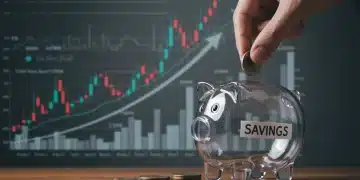Navigating the credit card industry during times of economic instability

Anúncios
Navigating the credit card industry during times of economic instability requires careful management of debt, building an emergency fund, and maximizing rewards responsibly to ensure financial stability.
Navigating the credit card industry during times of economic instability can be tricky. It’s essential to stay informed and make wise choices to protect your finances. Ever wondered how you can harness your credit card effectively when the economy wobbles? Let’s explore.
Anúncios
Understanding credit card basics in tough times
Understanding credit card basics in tough times is crucial for managing your finances effectively. Whether you’re facing unemployment or just tighter budgets, knowing how to navigate your credit card can help you stay afloat.
Anúncios
Key Credit Card Terms
Before diving deeper, it’s important to understand a few key terms related to credit cards:
- APR: This is the annual percentage rate, which shows how much interest you’ll pay on any balance you carry.
- Credit Limit: This is the maximum amount you can borrow on your card.
- Minimum Payment: The smallest amount you can pay to keep your account in good standing.
Knowing these terms can make a significant difference. For example, a high APR can cost you when you carry a balance. It’s often best to pay your full balance each month if you can.
Utilizing Your Card Wisely
In tough economic times, it’s essential to use your credit card wisely.
This means only charging what you can afford to pay back. Avoid using your card for unnecessary purchases, as this can lead to debt.
Additionally, maintaining a low balance relative to your credit limit helps improve your credit score. A good rule of thumb is to keep your utilization below 30%.
Being aware of these practices not only helps you manage your finances better but also protects your credit score during economic instability.
Emergencies and Credit Cards
Your credit card can also be a safety net during emergencies. If you suddenly face unexpected expenses, having the ability to tap into your credit can be invaluable.
However, it’s important to have a strategy in place. Limit your usage to true emergencies to avoid falling into a debt trap.
By understanding these credit card basics, you can navigate financial challenges more effectively and maintain control over your financial future.
Choosing the right card for your financial situation

Choosing the right card for your financial situation is essential for managing your finances wisely. With so many options available, selecting the best credit card can seem overwhelming. However, with a little knowledge, you can make an informed choice that aligns with your needs.
Types of Credit Cards
There are several types of credit cards available, each designed for different financial needs:
- Rewards Cards: Ideal for those who want to earn points or cash back on purchases.
- Balance Transfer Cards: These cards typically offer low or 0% interest rates on transferred balances, making them great for paying down debt.
- Secured Cards: Perfect for individuals looking to build or rebuild their credit history.
Choosing the right type depends on your financial goals and situation. For instance, if you’re focused on repairing your credit score, a secured card might suit you best.
Assessing Your Financial Habits
Before making a decision, take a moment to evaluate your financial habits. Ask yourself how often you use a credit card and for what purposes. If you frequently travel, a rewards card that offers travel perks may be beneficial.
Additionally, consider how much debt you currently carry. If you have existing balances, a balance transfer card could help you manage your payments more effectively. Understanding your spending patterns can lead you to the ideal credit card.
Don’t forget to look closely at fees and interest rates. Some cards come with annual fees, which could offset any rewards you earn if you’re not using the card enough. It’s crucial to choose a card that provides value based on your usage.
Researching Offers
Once you’ve narrowed down your options, research current offers. Many credit cards come with introductory bonuses or promotional rates that can be appealing.
Comparing different cards online can help you quickly spot the best deals. Websites that allow side-by-side comparisons are especially helpful. Take the time to read customer reviews and terms associated with the card.
By taking a strategic approach to choosing the right credit card, you can ensure it complements your financial situation, making your money management easier and more effective.
Managing credit card debt during economic downturns
Managing credit card debt during economic downturns can be challenging, but it is crucial to stay on top of your finances. Many people find themselves struggling as incomes fluctuate or job security decreases. Understanding how to handle your debt effectively can relieve some of this stress.
Assessing Your Current Debt Situation
The first step in managing credit card debt is to assess your current situation. Take a moment to list all your credit cards along with their balances and interest rates. Knowing your total debt can help you create a plan.
Next, consider how much you can afford to pay each month. This allows you to prioritize which debts to tackle first. If you have cards with high interest rates, focus on those. Paying them down can save you money in the long run.
Creating a Budget
Creating a budget is a vital part of managing credit card debt. A well-structured budget will help you keep track of your income and expenses. Start by listing your essential expenses, like rent, utilities, and groceries.
- Include your minimum payments: Make sure to factor in the minimum payments for each credit card.
- Identify discretionary spending: Look for areas where you can cut back, such as dining out or entertainment.
- Allocate more toward debt: Use any savings from your discretionary spending to pay down your credit card debt faster.
A budget can empower you to make informed choices about your finances. Stick to it, and adjust as necessary to ensure it works for you.
Strategies for Paying Down Debt
There are several strategies for paying down debt effectively during tough times. One popular method is the snowball method. This involves focusing on paying off your smallest debt first, giving you a sense of accomplishment.
Alternatively, the avalanche method targets debts with the highest interest rates first. This can save you money in interest payments overall. Choose the method that motivates you best.
Additionally, don’t hesitate to contact your credit card issuer. Many companies offer hardship programs, which could lower your interest rate or provide temporary relief. Sticking to a plan is the key to overcoming credit card debt in difficult economic times. The more proactive you are, the better your chances of financial stability.
Maximizing rewards and benefits responsibly

Maximizing rewards and benefits responsibly is key to making the most out of your credit card. By understanding how rewards programs work, you can benefit from your spending without falling into debt. It’s essential to strike a balance between enjoying perks and staying within your budget.
Understanding Rewards Programs
There are various types of rewards programs available, and each one can offer different benefits. Some popular options include:
- Cash Back: These cards give you a percentage of your purchases back in cash.
- Points: Points can be accumulated and redeemed for products, travel, or other perks.
- Travel Miles: Many cards allow you to earn miles that can be used for flights and hotel stays.
Before choosing a card, it’s important to consider your spending habits. If you travel frequently, a card that offers travel rewards might suit you. However, if most of your spending is on groceries, a cash back card may be more beneficial.
Utilizing Rewards Effectively
Once you have a rewards card, you can start earning benefits. Make sure to use your card for regular purchases, but don’t overspend just to earn rewards. Stick to what you can afford.
Another tip is to pay your balance in full each month. This practice helps you avoid interest charges that can negate your rewards. Remember, the goal is to use your credit card as a tool rather than a crutch.
Also, take note of any bonus categories that your card may offer. Many cards have rotating categories where you can earn more rewards during specific quarters, such as increased cash back on groceries or gas.
Being Mindful of Fees
While maximizing rewards is attractive, be mindful of any fees associated with the card. Some cards have annual fees that could offset the benefits if not used properly. Evaluate whether the rewards you earn outweigh the cost of maintaining the card.
It’s also important to keep an eye on your spending limit. Utilizing too much of your credit limit can lower your credit score, affecting your future borrowing power. Aim to keep your utilization below 30%. This approach ensures you can enjoy your rewards without risking your financial health. By taking a responsible approach to maximizing rewards, you can enhance your financial life without unnecessary risks.
Preparing for future economic challenges
Preparing for future economic challenges is essential to ensure your financial stability. Economic downturns can happen unexpectedly, and having a plan in place can help you navigate through tough times. Building good financial habits now is the first step towards being ready.
Building an Emergency Fund
An emergency fund acts as a safety net during difficult times. It’s recommended to save at least three to six months’ worth of living expenses. This fund should be easily accessible and used only for emergencies, such as unexpected medical bills or job loss.
A solid emergency fund gives you peace of mind, knowing you have resources to fall back on. Start small by saving a little each month. You can gradually increase your savings as your financial situation improves.
Reducing Debt
Another important step is to focus on reducing your debt. High debt levels can strain your finances, especially during economic downturns. Make a plan to pay down credit card balances and other loans.
- Prioritize High-Interest Debt: Start with the debts that carry the highest interest rates.
- Make Extra Payments: Any extra income can go straight to debt repayment.
- Avoid New Debt: Try not to take on new debt until you’ve reduced your existing obligations.
By actively managing your debt, you’ll be in a better position to handle future financial challenges.
Diversifying Income Streams
Diversifying your income streams can also protect you from economic instability. Consider ways to earn additional income, such as freelance work, part-time jobs, or starting a side business. Having multiple sources of income can cushion you during hard times.
Additionally, investing in your skills can open up new job opportunities. This might involve taking courses or certifications that enhance your skill set. The more marketable you are, the better your chances of securing stable employment, even in fluctuating economic conditions.
Regularly Reviewing Your Financial Plan
Lastly, regularly review your financial plan. As your situation changes, so should your financial strategies. Set aside time each month to assess your budget, savings, and investments.
Adjust your goals as needed and remain flexible. Financial preparedness is an ongoing process, and staying informed can help you adapt to changes in the economic environment. By taking these steps, you can effectively prepare for future challenges and ensure a more secure financial future.
In conclusion, navigating the credit card industry during times of economic instability requires careful planning and informed decision-making. By understanding the basics of credit cards, managing debt, and maximizing rewards, you can take control of your financial future. Preparing for unforeseen economic challenges ensures you remain resilient, allowing you to adapt and thrive, regardless of external circumstances. Always remember that small, consistent actions lead to significant financial stability over time.
FAQ – Questions About Navigating the Credit Card Industry
What is the best way to manage credit card debt during economic instability?
Focus on making more than the minimum payments and aim to pay off high-interest debt first to reduce your financial burden.
How can I build an emergency fund effectively?
Aim to save at least three to six months’ worth of living expenses in a separate savings account for easy access during tough times.
What should I consider when choosing a credit card for rewards?
Look for cards that offer rewards aligned with your spending habits, whether it’s cash back, points, or travel rewards, and ensure the benefits outweigh any fees.
How often should I review my financial plan?
It’s advisable to review your financial plan at least once a month to ensure you stay on track with your budget and adjust for any changes in your financial situation.







